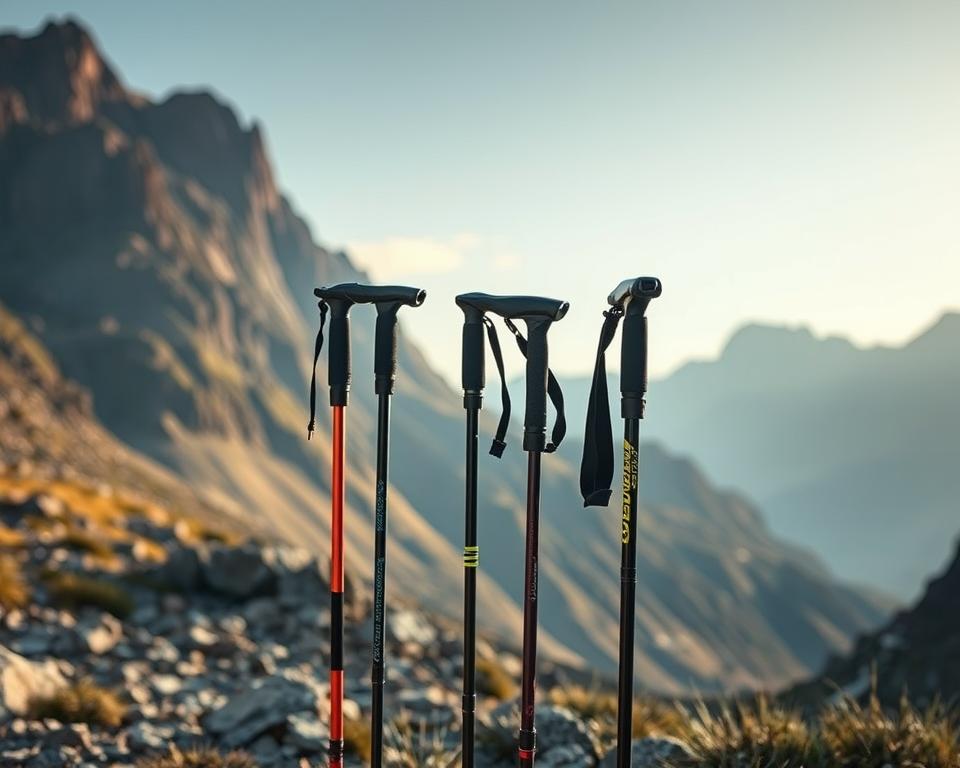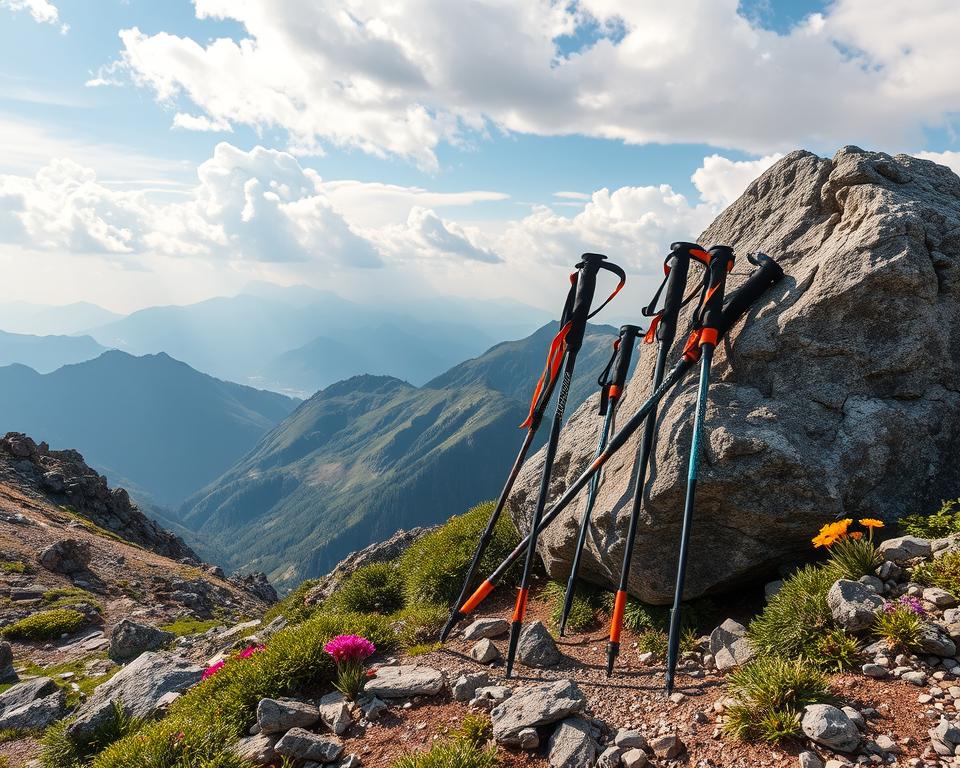Trekking poles are a key part of my hiking equipment, especially on tough trails. In this review, I’ll share my top picks for trekking poles. They offer stability and support, making hiking safer and more fun.
I looked at various sources, including Backpacking Light and Backpacker Magazine, to find the best poles. I also watched many video reviews. Through this research, I discovered the top lightweight trekking poles for serious hikers.
Research, like that from the University of Canberra, shows trekking poles reduce muscle soreness. Another study from UMass Amherst found they help carry heavy loads better. Ryan Bradley’s tests of over a dozen sets also helped shape my choices.
These poles increased my hiking speed and eased joint pain, boosting my confidence on rough paths. While not medical devices, trekking poles are crucial for steep or uneven terrain.
This review highlights the best trekking poles for rugged terrain. It focuses on ergonomic design and material balance. Let’s explore why these trekking poles are essential for every adventurer.
Introduction to Trekking Poles for Rugged Terrain
When you plan treks across rough lands, good gear is key. Trekking poles are a top item you need. They help you stay balanced on bumpy paths and ease knee stress when going downhill. It’s clear that in tough spots, trekking poles are a big help.
One big plus of trekking poles is they lessen knee pressure by up to 25%. This is great for long walks and steep drops, where knees often hurt. These poles do more than support; they also make your hike 30% tougher. This is good for those who want a serious workout in nature.
Trekking poles can be tailored for different adventures. Some poles are made for snowy and icy hikes, like alpine gear. Carbon fiber poles are light but strong, perfect for long treks. Though they cost more, they’re worth it. Yet, aluminum poles are tough, cost less, and are great for rough trails.
Choosing the right poles makes your trekking better. Most people like poles that slide to adjust length. Poles with external locks are reliable and easy to use, but a bit heavy. These features make your hike easier and more fun.
Keep these things in mind, and you’ll find the best trekking poles for your adventures. Be it mountain hiking or walking uneven paths, the right poles can make a difference.
Best Overall Trekking Poles
Looking for the best trekking poles for rugged terrain? The MSR DynaLock Ascent Carbon and Leki Cressida FX Carbon poles are top-notch. Their carbon fiber construction gives them an edge. Let’s explore the qualities that put these trekking poles ahead of the rest.
MSR DynaLock Ascent Carbon
The MSR DynaLock Ascent Carbon poles excel in versatility, comfort, and adjustability. They scored an impressive 85 out of 100. These poles are made of high-quality carbon fiber. This makes them both strong and light.
They weigh 17.0 oz per pair, offering a good balance of weight and durability. The ergonomic grips add comfort for long hikes. They are easy to adjust and collapse to 14.3 inches, which is great for packing. Though a bit heavier than some, they’re a top pick for adventurers.
Leki Cressida FX Carbon
The Leki Cressida FX Carbon poles are designed for women, scoring 82 out of 100. They are made from carbon fiber, combining durability with lightness. Each pair weighs just 17.0 oz. The grips fit smaller hands well, enhancing comfort.
These poles stand out with their foldable design, shrinking to 16.0 inches. This means they’re easy to carry in a backpack. Their lightweight design and quick-fold feature make them a prime choice for those seeking top performance without the bulk.
Budget-Friendly Options
Looking for the right trekking poles on a budget can seem hard. But, there are models that offer both quality and affordability. Let’s explore two great options that are both cost-effective and perform well.
Black Diamond Distance Z
The Black Diamond Distance Z trekking poles are a top pick for those watching their wallets. They’re light and easy to carry, making them perfect for anyone looking to save. Made with strong aluminum, they are both sturdy and lightweight.
They may not have all the fancy features of pricier poles, but they’re great for day hikes.
These poles are a smart choice because they’re durable and don’t cost much. They’re ideal for both hiking beginners and experienced trekkers who need an extra pair. Their performance is impressive for the price.
Trekology Trek-Z 2.0
The Trekology Trek-Z 2.0 is another excellent, budget-friendly option. These poles are durable and won’t empty your wallet, priced at just $44. They weigh about 1 lb. 8 oz., offering a good mix of strength and lightness.
They fold down to just 15 inches, so they’re easy to carry around. They can be adjusted to fit different heights, making them versatile. This model shows you don’t have to spend a lot for quality trekking poles.
Best trekking poles for rugged terrain
Finding the right trekking poles for tough trails involves looking at weight, comfort, durability, and how they work. The Leki Cressida FX Carbon AS and Leki Makalu FX Carbon AS are great for long hikes. They are made of carbon fiber, making them light and easy to handle, which is important on hard trails.
The weight of trekking poles affects their balance and how easy they are to use. The Leki Makalu FX Carbon AS weighs 534g (1lb 3oz), which is a good mix of being strong but not too heavy. On the other hand, the Black Diamond Distance Carbon FLZ Hiking Poles and TheFitLife Carbon Fibre Trekking Poles weigh just 400g (14oz), making them some of the lightest you can find. Choosing the right poles can reduce joint strain by up to 25%, making your hike more comfortable.
Some materials can make your hands sweat more, like the Regatta Ultralite hiking poles, compared to the Leki Makalu FX Carbon AS. It’s important to pick the right material for difficult paths. Aluminum poles are strong, lightweight, and don’t rust, making them ideal for tough conditions.
When choosing between telescopic and foldable trekking poles, think about what you need. Foldable ones, like the Leki Makalu FX Carbon AS and Black Diamond Distance Carbon FLZ, are great for saving space. Easy-to-use adjustment systems prevent injuries and make your hike better. The Pacerpole Dual Lock and Silva Trekking Poles Carbon are also top choices for difficult trails, according to reviews.
In the end, comparing trekking poles shows personal preference matters based on your hiking style and trail needs. Whether you choose carbon fiber poles for long distances or aluminum ones for rough terrains, selecting the right gear improves your hiking experience and safety.
High-Performance Poles
When we talk about superior trekking poles, Black Diamond and Gossamer Gear lead the pack. They’re known for their light, yet sturdy designs. These brands craft poles perfect for tough trails and more.
Black Diamond Pursuit
The Black Diamond Pursuit is a top pick for those wanting high-quality trekking poles. They combine ease, durability, and a good price. These poles have comfy grips and adjust easily, great for daily hikes or snow adventures.
They’re built tough, so they last long, even on rough paths.
Gossamer Gear LT5
The Gossamer Gear LT5 is ideal for fans of super light poles. They cost $195 and are incredibly light but still strong. Each pair weighs just 280 grams, thanks to top-notch carbon fiber.
Despite their lightness, they’re durable and easy to handle in tough spots.
Both the Black Diamond Pursuit and Gossamer Gear LT5 are excellent. Whether you want light poles or something even lighter, they’re great for hiking.
How to Choose the Right Trekking Poles
When choosing trekking poles, pay attention to key factors. It’s vital to explore features that match your hiking style. For instance, consider if you need poles for rough trails or smooth paths. An important feature is adjustable length.

Adjustable trekking poles are liked for their flexibility. Three-section telescoping poles can adjust between 12 and 16 inches, offering stability. Folding poles, though lighter and more compact, might not be as strong. Combination poles mix traits from both types, allowing for some adjustability.
Material choice is crucial. Carbon fiber poles are light, great for fast hiking and climbing, yet they may break under pressure. On the other hand, aluminum poles are tougher, perfect for long treks as they bend but don’t break.
Grip comfort is key too. Cork grips provide comfort, good hold, and resist sweat better than rubber and foam. This is vital for long hikes to keep your hands comfortable.
The locking mechanism is also important. Lever locks, usually made of aluminum, are better than twist locks. They are sturdy and easier to adjust, even in the cold or with gloves.
Picking the right length for your trekking pole is crucial for comfort and efficiency. Your elbow should be at a 90-degree angle when holding the pole. This posture helps lower the strain on your knees by up to 40% during downhill walks and reduces overall knee strain by 25%.
Also, don’t forget about extra features like baskets and pole tips. Small baskets work well for dry hiking, while larger ones are for snow activities.
By considering these points, you can find trekking poles that enhance your hiking by offering the right balance of weight, toughness, and comfort.
How Do the Best Trekking Poles Enhance the Experience of Using Hiking Tents?
The best trekking poles enhance the experience of using hiking tents by providing crucial stability and support on uneven terrain. When paired with the best budget hiking tents for outdoor adventures, these poles make navigation easier, allowing campers to set up their shelters quickly and securely, even in challenging conditions.
Conclusion
Wrapping up this guide on trekking pole recommendations, I’ve learned a lot. Choosing the best hiking gear often depends on what you need and like. The MSR DynaLock Ascent Carbon and Leki Cressida FX Carbon are great choices because they perform well and last long. Meanwhile, the Black Diamond Distance Z and Trekology Trek-Z 2.0 show that you can find quality without spending a lot. These are perfect for hikers watching their budget.
For those who seek top performance, the Black Diamond Pursuit and Gossamer Gear LT5 stand out. They have cutting-edge designs and are made with the best materials. They’re ideal for serious hikers facing tough trails. From my adventures, such as crossing a high pass in the Wind River Range or hiking 400 miles, I can say these options give you an advantage on hard paths.
Finding the right equipment for trekking rugged trails depends on how you hike and the trails you choose. When picking hiking poles, consider their price, performance, and how long they’ll last. Make sure they give you the support and stability you need. From my experiences, even poles that have been through a lot, like tip replacements or small breaks, can make a big difference in your outdoor adventures.
Here’s to choosing the trekking poles that work best for you. Happy trails and may your hiking be full of rewards!

